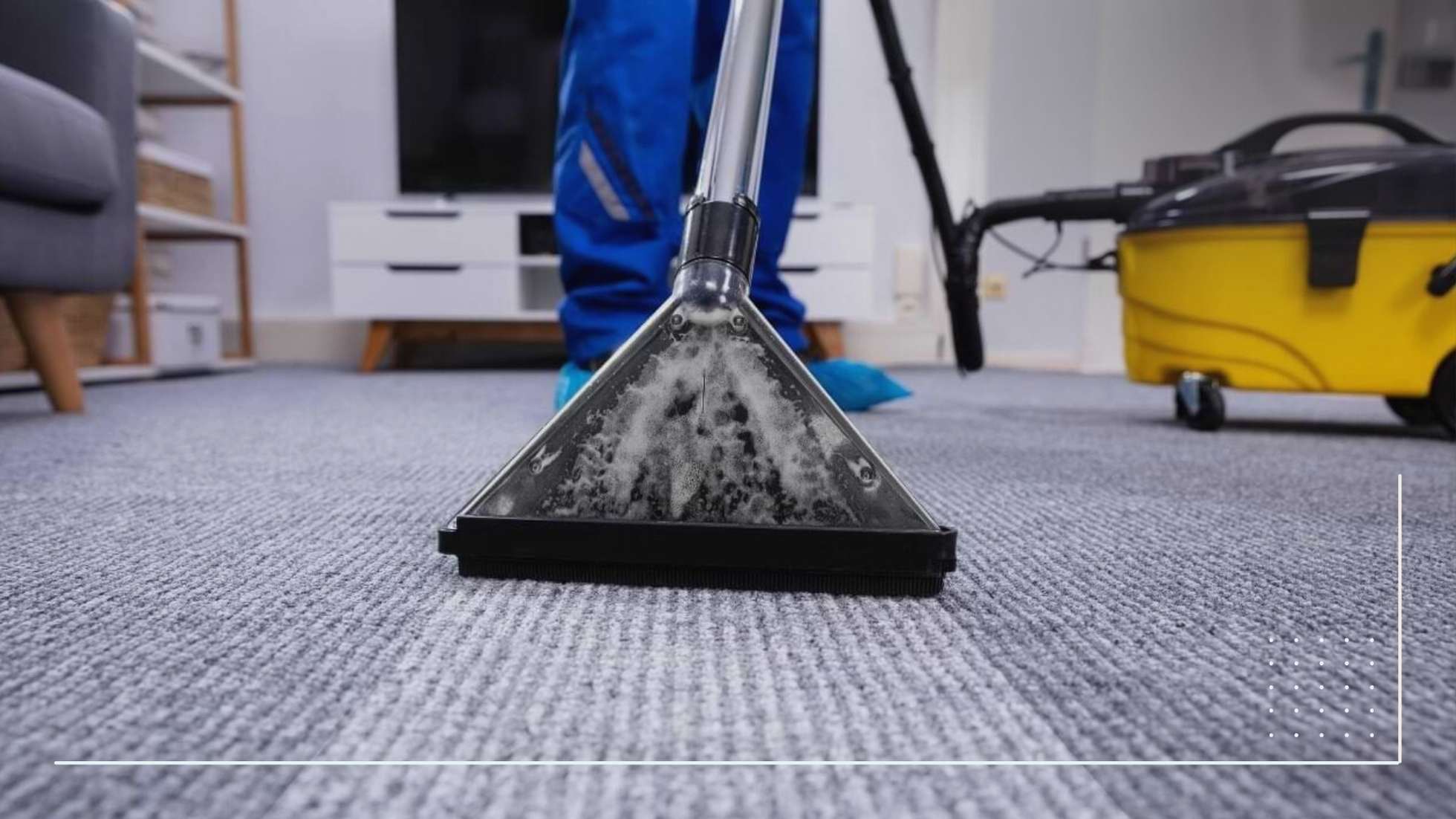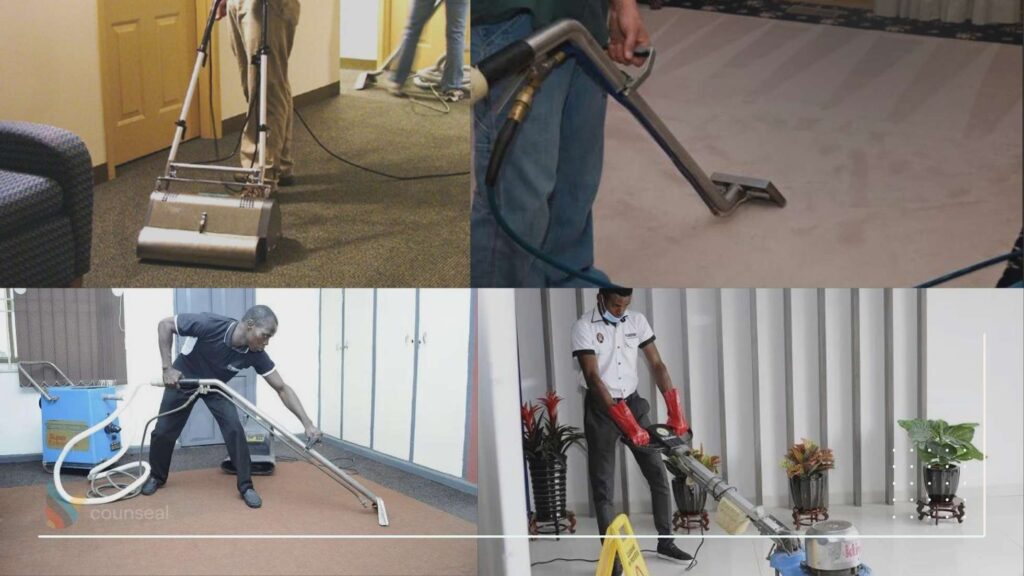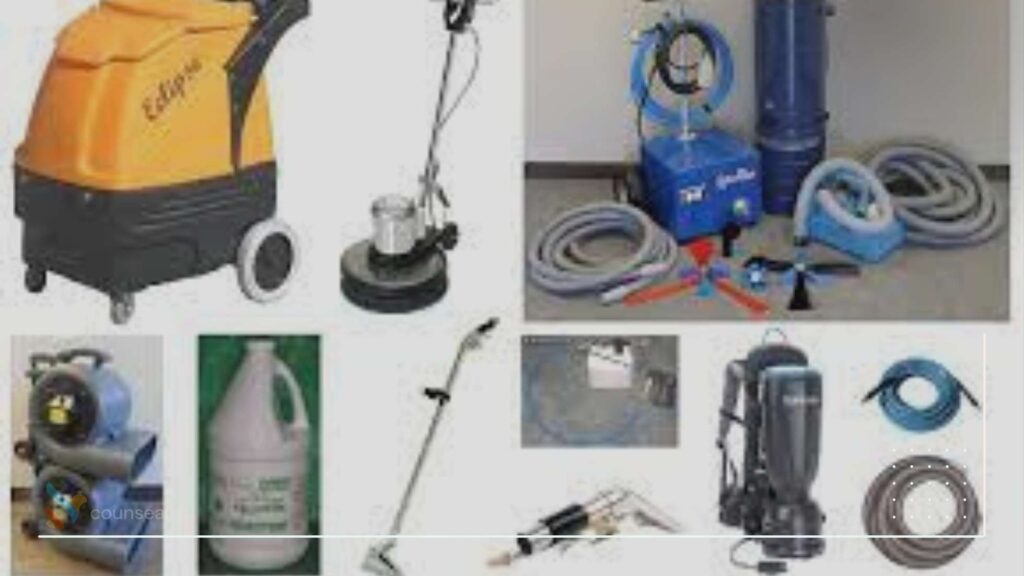Start a Carpet Cleaning Business in Nigeria: 7-Step Guide

by Counseal Team
Updated July 26, 2024

In a bustling country like ours, where we appreciate the beauty of well-decorated interior spaces, the demand for professional carpet cleaning services is on the rise. Carpets not only enhance the aesthetic appeal of homes and offices but also offer comfort and warmth.
However, they require regular maintenance to keep them in pristine condition.
That’s where a carpet cleaning business comes into play.
Running a carpet cleaning business in Nigeria is not without its challenges, just like any other venture.
From acquiring suitable cleaning equipment to maintaining customer satisfaction and dealing with intense competition, it’s a journey that requires grit and resilience.
But the benefits – low initial investment, high profit potential, and flexibility of operation – make it an attractive option for many budding entrepreneurs.
So, if you’re ready to roll up your sleeves and dive into the nitty-gritty of the carpet cleaning business, then stick around. You’re in for an enlightening read.
Quick Takes
How much does it cost to start this business?
The cost of starting a carpet cleaning business in Nigeria depends on several factors, such as the type of cleaning service, the equipment and materials needed, the location and size of the business, the marketing and branding strategy, and the legal and operational requirements.
Some of the expenses that you may need to consider are:
- Business registration and licensing fees
- Cleaning equipment and supplies, such as vacuum cleaners, steam cleaners, brushes, detergents, etc.
- Transportation and fuel costs for moving the equipment and staff to different locations
- Rent and utilities for the office or storage space
- Salaries and benefits for the employees
- Insurance and taxes
- Advertising and promotion costs
The initial investment for a carpet cleaning business in Nigeria can range from ₦1.7 million to ₦12.7 million, depending on the franchise option and the level of service. The start-up capital can be as low as ₦500,000, if you operate from home and use minimal equipment.
You should also research the market demand and competition for carpet cleaning services in your area, and identify your target customers and niche. Some of the potential customers for carpet cleaning services are households, offices, hotels, schools, churches, and event centres.
How much can you make per month?
The monthly income of a carpet cleaning business in Nigeria can vary depending on the number of clients, the type of service, the pricing strategy, and the operating costs. A solo carpet cleaning business owner can potentially earn between ₦437,500 – ₦1,250,000 per month. However, this is just an estimate and not a guarantee. Your actual income may be higher or lower depending on various factors.
- If you want to maximise your carpet cleaning business income, you may want to consider the following tips:
- Offer high-quality and professional services that meet or exceed your customers’ expectations
- Diversify your services and offer additional or complementary services, such as upholstery cleaning, tile and grout cleaning, rug cleaning, etc.
- Use effective marketing and promotion strategies, such as word-of-mouth, referrals, online platforms, flyers, etc.
- Build a loyal customer base and encourage repeat business and referrals
- Optimise your pricing strategy and charge competitive rates that reflect the value of your services
- Reduce your operating costs and expenses by using efficient equipment, supplies, and methods
- Seek out new opportunities and expand your market reach by targeting different segments, such as residential, commercial, or industrial customers
What is the minimum required to start this business?
The minimum required to start a carpet cleaning business in Nigeria depends on the type of service you want to offer and the equipment and supplies you need. Based on some sources, you may need the following items:
- Business registration and licensing fees
- Cleaning equipment and supplies, such as vacuum cleaners, steam cleaners, brushes, detergents, etc.
- Transportation and fuel costs for moving the equipment and staff to different locations
- Rent and utilities for the office or storage space (optional if you operate from home)
- Insurance and taxes
One source estimates that the start-up capital can be as low as ₦500,000, if you operate from home and use minimal equipment. However, this may vary depending on your location, market demand, and competition. You may want to do some research and create a budget plan before you start your business.
What are the best states to start this business?
The best states to start a carpet cleaning business in Nigeria are those that have a high demand for cleaning services, a large population of potential customers, and a low level of competition. Some of the factors that may influence the demand for cleaning services are:
- The level of urbanisation and development
- The climate and weather conditions
- The income and lifestyle of the residents
- The availability and affordability of alternative cleaning options
Based on these factors, some of the states that may be suitable for starting a carpet cleaning business in Nigeria are:
Lagos: Lagos is the most populous and developed state in Nigeria, with a large number of residential and commercial buildings that require regular cleaning. Lagos also has a humid and tropical climate, which makes carpets prone to dust, dirt, and mould. Lagos is a major economic and commercial hub, with a high income and spending power of the residents. Lagos also has a vibrant and competitive cleaning industry, which means that you will need to offer high-quality and professional services to stand out from the crowd.
Abuja: Abuja is the capital city and the second most populous state in Nigeria, with a high concentration of government offices, businesses, hotels, and embassies that require cleaning services. Abuja also has a relatively dry and dusty climate, which makes carpets susceptible to stains and allergens. Abuja is a wealthy and cosmopolitan city, with a diverse and sophisticated population that values cleanliness and hygiene. Abuja also has a growing and dynamic cleaning industry, which means that you will need to offer innovative and customised services to meet the needs of your clients.
Rivers: Rivers is one of the oil-rich and industrialised states in Nigeria, with a large number of oil and gas companies, factories, and refineries that require cleaning services. Rivers also have a hot and humid climate, which makes carpets prone to odours and bacteria. Rivers is a prosperous and modern state, with a high standard of living and a preference for convenience and comfort. Rivers also has a moderate and stable cleaning industry, which means that you will need to offer reliable and affordable services to attract and retain your customers.
These are just some of the possible states that you can consider for starting a carpet cleaning business in Nigeria.
However, you may also want to do your own research and analysis of the market demand, competition, and opportunities in other states, such as Oyo, Kano, Kaduna, Anambra, etc.
You may also want to consult with local experts, associations, and authorities to get more insights and guidance on the best locations for your business.
What are the known examples of this business?
Some of the known examples of carpet cleaning businesses in Nigeria are:
Anago Cleaning Systems: This is a commercial cleaning franchise system that supports more than 1,700 unit franchisees in the United States and internationally. It offers a variety of cleaning services, including carpet and upholstery cleaning, window cleaning, floor care, and disinfection. It also provides initial contracts, training, and support for its franchisees.
Jan-Pro Cleaning and Disinfecting: This is the #1 commercial cleaning franchise that provides cleaning and disinfecting services to individuals, households, offices, and industries. It uses specialised cleaning equipment, chemicals, and techniques to ensure the cleanliness and hygiene of the environment. It also provides the customers, certification, and support for its franchisees.
Cleaneat Integrated Services: This is one of the top cleaning companies in Nigeria that specialises in regular and one off domestic cleaning as well as office cleaning services. It offers carpet and upholstery cleaning, fumigation, pest control, floor polishing, and waste management services. It also uses innovative and efficient cleaning methods and equipment4.
These are just some of the examples of carpet cleaning businesses in Nigeria. You may also want to do your own research and find out more about other cleaning businesses in your area or online.
In the meantime, let’s run through the 7 steps to starting a carpet cleaning business.
Step 1: Find Your Niche and Service

One of the most crucial steps in launching a carpet cleaning business in Nigeria is identifying your niche and service. This is not just about choosing a field you’re comfortable with, but it’s about finding a sector that aligns with your skills, passion, and the market demand.
Why is it Important to Find Your Niche and Service?
Finding your niche and service is akin to laying the foundation for your business. It helps you establish a clear direction and focus for your venture. You wouldn’t want to be a jack of all trades, master of none, would you? Specialising in a specific service or catering to a particular niche allows you to hone your skills, build your reputation, and stand out from the competition.
Popular Carpet Cleaning Niches and Services in Nigeria
There’s a wide array of niches and services within the carpet cleaning industry in Nigeria. Some of the most popular ones include:
- Residential Carpet Cleaning: This involves providing carpet cleaning services to homeowners. It’s a growing niche due to the increasing demand for professional home cleaning services.
- Commercial Carpet Cleaning: This caters to businesses such as offices, hotels, and restaurants. These establishments often require regular and thorough carpet cleaning, creating a steady demand for this service.
- Steam Carpet Cleaning: A service that involves using steam for deep cleaning carpets. It’s popular due to its effectiveness in removing dirt and allergens.
- Dry Carpet Cleaning: This service uses little to no water, making it a preferred choice for businesses that can’t afford downtime waiting for carpets to dry.
How to Research Your Niche and Service
Now, you’re probably wondering, “How do I find the right niche and service?” Here are a few tips to get you started:
- Browse Online Platforms: Websites, social media, and online forums can provide insights into the most in-demand carpet cleaning services.
- Visit Local Carpet Cleaning Businesses: Paying a visit to existing businesses can give you a first-hand understanding of the services they offer and the niches they serve.
- Follow Trends: Stay updated with the latest trends in the carpet cleaning industry. This can help you identify potential niches and services that are gaining popularity.
Step 2: Plan Your Business

Starting a business without a plan is like setting off on a journey without a map. You might stumble upon your destination, but the chances are you’ll get lost. That’s why planning your business is crucial.
A business plan not only serves as your business’s roadmap but also as a robust communication tool for potential investors and lenders. It provides them with detailed information about your strategies to achieve sales and profit objectives.
Key Elements of a Business Plan
A solid business plan should at least consist of these elements:
- Mission Statement: This is your business’s core purpose, the reason it exists. It should clearly define what your business is, who your customers are, and the value you bring to them.
- Goals: These are specific objectives your business aims to achieve, usually within a set timeframe. Example: “Achieve 20% market share in the Nigerian carpet cleaning industry by 2025.”
- Market Analysis: This section should detail your knowledge of the market dynamics, including customer segmentation, market size, and growth rate.
- Competitive Analysis: Here, you should demonstrate your understanding of your competition. What are their strengths and weaknesses? How does your business differentiate itself?
- Marketing Strategy: This lays out your plan to attract and retain customers. It should detail your pricing strategy, promotional plans, and distribution channels.
- Financial Plan: This section showcases your business’s current and projected financial status. It should include income statements, balance sheets, and cash flow statements.
How to Write a Business Plan
Writing a business plan might seem daunting, but don’t worry. You don’t have to start from scratch. Plenty of online templates, tools, and guides are available to help you. Here’s a simple approach:
- Use Online Resources: Websites like Bplans and Tarkenton GoSmallBiz offer free business plan templates tailored to various industries.
- Consult Experts: Consider seeking advice from industry experts or experienced entrepreneurs. They can provide valuable insights and help you avoid common pitfalls.
- Review Samples: Reviewing sample business plans from similar businesses can provide you with a practical reference point.
For instance, you can follow this link to access a sample business plan for a carpet cleaning business in Nigeria. This will give you a better understanding of what a finished plan might look like and the kind of detail you should include.
Remember, writing a business plan shouldn’t be a one-time event for your business. It should be a living document, regularly reviewed and updated as your business grows and changes.
So, gather your ideas, do your research, and start planning your business today. The road to successful entrepreneurship begins with a well-thought-out business plan.
Step 3: Register Your Business

You’ve got your business idea, you’ve done your market research, and you’re raring to go. But wait. Have you registered your business yet? If you’re shaking your head, it’s time to press the pause button.
Registering your business in Nigeria is not just a legal requirement; it’s essential for your business’s future growth and credibility.
This process not only ensures you don’t run into legal hitches down the line but also sets you up for success when it comes to things like securing funding, attracting customers, and establishing a solid reputation in your industry.
Steps to Register Your Business
1. Choose Your Business Name
First things first, you need to decide on a name for your business. This is an important step as the name will represent your brand and its values.
2. Decide on Your Business Structure
Next, you’ll need to choose your business structure. Will you operate as a sole proprietor, a partnership, or a limited liability company? Your decision will affect your tax liabilities and legal responsibilities, so it’s important to make the right choice.
3. Choose Your Business Location
Your business location matters, not just for operational reasons but also because different states in Nigeria have different business regulations and tax requirements.
4. Obtain Necessary Permits and Licences
Depending on your business type, you may need to obtain certain permits and licences to operate legally.
5. Get Your Tax Identification Number
Lastly, you’ll need to obtain your tax identification number (TIN) from the Federal Inland Revenue Service. This number is crucial for tax purposes.
Tips and Resources for Registering Your Business
Now that you know the steps, how do you actually go about registering your business in Nigeria?
1. Visit the Corporate Affairs Commission Website
The Corporate Affairs Commission (CAC) is responsible for business registration in Nigeria. You can start the registration process by visiting their official website.
2. Consider Hiring a Lawyer
While it’s possible to handle the business registration process yourself, you may find it helpful to have a lawyer guide you, especially if your business structure is a bit complex.
3. Be Patient and Diligent
The registration process may take some time and require a fair amount of paperwork. Stay patient, stay diligent, and remember: it’s all part of the journey towards entrepreneurship.
Remember, registering your business is not just a legal requirement—it’s a critical step in establishing your business’s credibility and setting it up for future success.
Step 4: Buy or Lease Your Equipments and Supplies

We’ve all heard the saying, “A workman is only as good as his tools.” This is particularly true in the carpet cleaning business.
Investing in quality equipment and supplies not only increases your efficiency but also guarantees excellent results for your clients, fostering trust and repeat business.
For instance, a high-quality carpet cleaning machine can remove even the toughest stains, leaving the carpet looking as good as new. This level of service is what distinguishes a top-notch carpet cleaning business from a mediocre one.
So whether you’re buying or leasing, ensure you go for the best quality you can afford.
Finding the Right Equipment and Supplies
Now that you understand the importance of quality, the next step is finding your equipment and supplies. You’re in luck because there are several sources available to you.
Online platforms like Jiji.ng and Alibaba offer a wide range of carpet cleaning equipment from various manufacturers. You can also check local suppliers or wholesalers in your area.
The advantage of local suppliers is that you can inspect the equipment before purchasing and, in some cases, negotiate a payment plan.
Choosing and Negotiating with Suppliers
When it comes to choosing a supplier, there are a few things you should consider. Price is, of course, a significant factor, but it shouldn’t be the only one.
You also want to consider the quality of the equipment, delivery terms, warranty, and the supplier’s reputation. A quick Google search can provide reviews and ratings for most suppliers.
Once you’ve shortlisted a few potential suppliers, it’s time to negotiate. Don’t be shy about asking for a discount, especially if you’re buying in bulk. Remember, every Naira saved is a Naira earned!
Mastering Your Equipment
Finally, it’s crucial to understand how to use your equipment effectively. There are several tutorials and videos online that can help you master common carpet cleaning techniques.
Remember, the more proficient you are with your tools, the better the service you can provide to your clients. Hence, don’t rush the learning process. Take your time to understand each piece of equipment thoroughly.
For example, the video below provides a comprehensive guide on how to use a carpet cleaning machine.
In conclusion, your equipment and supplies can make or break your carpet cleaning business. So, take the time to choose wisely and invest in quality. It will pay off in the long run!
Step 5: Hire and Train Your Staff

In the carpet cleaning business, your staff are your frontline soldiers. They’re the ones representing your brand, interacting with your clients, and doing the actual cleaning work. That’s why hiring and training qualified and reliable staff isn’t just important—it’s essential.
Hiring the Right People
How do you find the right people for your team? Here are some steps to guide you:
- Post Job Ads: Start by advertising your vacancies on job boards, social media, or local newspapers. Make sure to clearly outline the job requirements and responsibilities.
- Conduct Interviews: Once you start receiving applications, it’s time to start interviewing. This is your chance to assess the applicant’s skills, experience, and attitude.
- Check References: Don’t skip this step! Contacting previous employers can provide valuable insights into the applicant’s work ethic and reliability.
Training Your Staff
Once you’ve hired your team, it’s time to train them. Even if they have previous experience, it’s important to ensure they understand your specific methods and standards. Here are some steps to guide you:
- Provide Orientation: Start with a general orientation to familiarise your staff with your company’s mission, values, and policies.
- Demonstrate Techniques: Show your staff the proper way to clean carpets. This could involve hands-on demonstrations or instructional videos.
- Monitor Performance: Keep an eye on your staff’s work, especially in the beginning. Provide constructive feedback to help them improve.
Motivating Your Staff
Last but not least, remember that a motivated staff is a productive staff. Here are some tips:
- Set Goals: Set clear, achievable goals for your staff. This gives them something to aim for and a sense of accomplishment when they reach these goals.
- Provide Feedback: Regularly provide feedback—both positive and constructive. This shows your staff that you appreciate their work and are invested in their growth.
- Offer Incentives: Consider offering incentives, such as bonuses or extra days off, for exceptional performance. This can boost morale and motivate your staff to do their best.
Remember, your staff are an integral part of your business. Invest in them, and they’ll invest in your business. Good luck with your hiring and training process!
Step 6: Price Your Services

I’ll let you in on a not-so-secret secret: pricing your services correctly and competitively is crucial to the success of your business. It’s a balancing act, you see. Price too high and you might scare off potential customers, too low and you’re leaving money on the table, not to mention devaluing your brand.
Factors to Consider in Pricing
Now, let’s get into the nitty-gritty of pricing. There are several factors that you should take into account.
First, there’s the cost of your equipment, labour, and overhead. These are your business’s operational expenses, and they’re non-negotiable. To break even, you’ll need to cover these costs. Sounds straightforward enough, right?
Then there’s your profit margin, the sweet spot where you make money. It’s a percentage markup on your costs. But here’s the kicker, your profit margin isn’t just about making money.
It’s also a safety net for unforeseen expenses, a reward for your risks and hard work, and a source of funds for future business growth.
Market demand is another factor. If there’s a high demand for your services and few competitors, you might be able to charge a higher price. But if the market is saturated, you’ll need to be more competitive with your pricing.
How to Price Your Services
Pricing is more than just numbers; it’s a strategy. Here are a couple of ways to go about it.
One way is to use online calculators, tools, or formulas. They can help you crunch the numbers and take the guesswork out of pricing.
Another method is to research your competitors. Find out what they’re charging for similar services and use that as a benchmark. But remember, you’re not trying to undercut them. You want to offer value for money while still making a profit.
In the end, pricing is an ongoing process. It’s not something you set and forget. You’ll need to review your prices regularly, taking into account changes in costs, market demand, and your competitors’ pricing.
So there you have it, folks. Pricing your services is essential, but it doesn’t have to be daunting. With a good understanding of your costs, the market, and a bit of strategic thinking, you can price your services to succeed in the market. Happy pricing!
Step 7: Market and Grow Your Business

There’s an old adage that says, “If you build it, they will come.” But as any seasoned entrepreneur will tell you, this isn’t exactly the case when it comes to business. You could have the best service or product in the world, but if no one knows about it, you’re not going to see the results you want. So, let’s dive into the importance of marketing, and how you can grow your business effectively.
The Importance of Marketing to Your Target Customers
Marketing is your ticket to visibility in the vast ocean of businesses. It’s the megaphone that allows your message to reach your target customers. Without it, your business is like a ship adrift at sea, with no compass to guide it towards the shore of success.
You see, marketing isn’t just about selling your product or service. It’s about conveying the value you’re offering, and why your target customers should choose you over your competitors. It’s about fostering relationships with your customers, understanding their needs, and providing solutions that cater to those needs.
By doing so, you’re not just making a sale, you’re creating a loyal customer base that will support your business in the long run.
Channels for Marketing and Growing Your Business
In today’s digital age, there are numerous channels you can leverage to market and grow your business. Here are a few that have proven to be effective:
- Online platforms: Online marketplaces like Jumia and Konga are popular in Nigeria and provide an excellent platform to reach a large audience.
- Social media: Social media platforms like Facebook, Instagram, Twitter, and LinkedIn are invaluable marketing tools that can help you engage with your audience, increase your reach, and boost your brand visibility.
- Websites and blogs: Having a professional website and regularly updating a blog with relevant, valuable content can help improve your business’s search engine ranking, making it easier for customers to find you.
- Email marketing: This is a cost-effective way to keep your customers informed about your latest offers, news, and updates.
Tips to Market and Grow Your Business
- Create a strong brand identity: Your brand identity is the face of your business. It includes your logo, colours, fonts, and other visual elements that make your business unique.
- Craft a compelling slogan: A catchy and meaningful slogan can make your business memorable and help convey your brand’s message effectively.
- Design attractive packaging: Good packaging isn’t just about protecting your product. It’s also a potent marketing tool that can influence a customer’s purchasing decision.
In conclusion, starting a carpet cleaning business in Nigeria is a viable and lucrative venture, with a promising market demand. We’ve journeyed through the essential steps together; from understanding the industry landscape, drafting a comprehensive business plan, acquiring the necessary equipment, training and certifications, to marketing your business effectively.
Now, the ball is in your court.
It’s time to take the leap and put these practical steps into action. Remember, starting a business is not a sprint, but a marathon – consistent effort and perseverance are key.
Frequently Asked Questions
How much does it cost to start a carpet cleaning business in Nigeria?
The cost of starting a carpet cleaning business in Nigeria depends on various factors, such as the size and scale of your business, the type and quality of your equipment and supplies, the location and rent of your office or van, the legal and tax fees, the marketing and advertising expenses, etc.
According to some sources, the average cost of starting a small-scale carpet cleaning business in Nigeria can range from N200,000 to N1,000,000 . However, this is only an estimate and you should do your own research and budgeting before starting your carpet cleaning business.
How do I find customers for my carpet cleaning business in Nigeria?
One of the most effective ways to find customers for your carpet cleaning business in Nigeria is to market and grow your business online. You can use various online platforms, such as social media, websites, blogs, etc., to showcase your services, niche, and brand identity.
You can also use online tools, such as email marketing, SEO, online ads, etc., to reach and attract your target audience. Additionally, you can use word-of-mouth, referrals, testimonials, and reviews to build trust and loyalty among your customers.
You can network and collaborate with other carpet cleaning businesses, local businesses, property managers, etc., to expand your customer base and exposure.
How do I choose a niche and a service for my carpet cleaning business in Nigeria?
Choosing a niche and a service for your carpet cleaning business in Nigeria is a crucial step that can help you stand out from the competition and cater to the specific needs and preferences of your customers.
You should choose a niche and a service that suits your skills, passion, and market demand.
You can research your niche and service by browsing online platforms, visiting local carpet cleaning businesses, following trends, etc.
You can also use online tools, such as surveys, polls, quizzes, etc., to get feedback and insights from your potential customers. Some examples of popular carpet cleaning niches and services in Nigeria are residential, commercial, steam, dry, etc.
How do I price my services correctly and competitively?
Pricing your services correctly and competitively is important to ensure that you cover your costs, make a profit, and stay ahead of the competition. You should price your services based on various factors, such as the cost of equipment, labour, overhead, profit margin, market demand, etc.
You can use online calculators, tools, or formulas to help you calculate your service prices.
You can also research your competitors and see how they price their services. You should also consider the value and quality of your services and how they differ from your competitors. You should also be flexible and willing to adjust your prices according to the changing market conditions and customer expectations.
How do I register my carpet cleaning business and comply with the legal and tax requirements in Nigeria?
Registering your carpet cleaning business and complying with the legal and tax requirements in Nigeria is essential to avoid any legal issues and penalties.
You should register your business and obtain a business permit, tax identification number, etc., from the Corporate Affairs Commission.
You should also choose a business name, structure, and location that suit your business needs and goals. You should also consult a lawyer or an accountant to help you with the legal and tax aspects of your business.
Keep track of your income and expenses and file your tax returns on time.
How do I buy or lease quality equipment and supplies for my carpet cleaning business?
Buying or leasing quality equipment and supplies for your carpet cleaning business is important to ensure that you produce high-quality and safe services for your customers.
You should buy or lease your equipment and supplies according to the type and scale of your services, the quality and warranty of the products, the delivery and maintenance of the suppliers, etc.
You should also compare prices and negotiate with suppliers to get the best deals. You should also invest in some common carpet cleaning equipment and techniques, such as vacuum cleaners, steam cleaners, dry cleaners, brushes, sprays, detergents, etc.
You should also clean and sanitise your equipment and supplies regularly and properly.
How do I hire and train qualified and reliable staff for my carpet cleaning business?
Hiring and training qualified and reliable staff for your carpet cleaning business is important to ensure that you deliver efficient and professional services to your customers. You should hire and train your staff according to the skills, experience, and attitude that you require for your business.
You should also post job ads, conduct interviews, check references, provide orientation, etc., to find and retain the best candidates. You should also manage and motivate your staff by setting goals, providing feedback, offering incentives, etc.
Ensure that your staff follow the health and safety standards and regulations in Nigeria.





